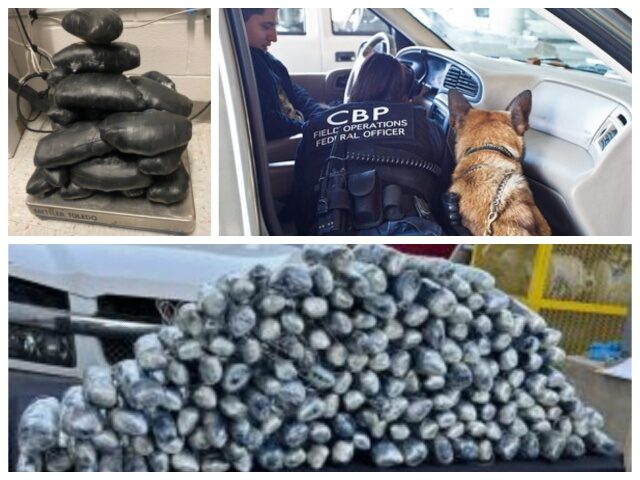Cartel Meth Smuggling Continues at Texas Border Despite Stiff Court Sentencing
 U.S. Customs and Border Protection
U.S. Customs and Border Protection
EAGLE PASS, Texas — As migrant crossings remain low in the once busiest crossing point in Eagle Pass, the movement of narcotics across the border continues in full swing. The seizures of methamphetamine by Customs and Border Protection continue at the ports of entry in the small town — even as federal courts sentence offenders to decades in prison for the offense.
A source within Customs and Border Protection, not authorized to speak to the media, says the Mexican cartel operating in Coahuila known as the Cartel Del Noreste (CDN) continues to move narcotics across the border into the United States as weapons and money return to Mexico to keep them in business. The source says the narcotics seizures are but a small portion of what crosses the border.
“What most don’t realize is to what extent the supply exceeds the demand,” the source stated. “The seizures are great, but we are being bombarded by the smugglers daily.”
The source says the stiff penalties being meted out in federal courts send a message, but the news is not getting out like it should. The source tells Breitbart Texas that the CDN and other cartels rely on a steady supply of uniformed drivers and mules to transport the narcotics across the border. The drivers appear unaware of how seriously the offense is considered by the federal courts in the area.
On Sunday, U.S. Customs and Border Protection officers at the Camino Real International Bride in Eagle Pass seized an illicit load of methamphetamine with a street value of nearly $300,000. The contraband was discovered carefully hidden in the firewall of a cartel smuggler’s vehicle. Port Director Pete Beattie said in a CBP press release, “Frontline officers at the Camino Real International Bridge demonstrated exceptional effort in successfully disrupting this drug smuggling attempt.”
The seizure occurred when a 25-year-old United States citizen attempted to enter the United States from Mexico in a 2015 Toyota Corolla. The inspecting officer decided to inspect the vehicle further by referring the man for a secondary inspection station. There, 29 packages containing 31.87 pounds of methamphetamine were found using a non-intrusive inspection system.
In late March, CBP officers at the nearby Eagle Pass Bridge One Port of Entry interdicted a single smuggling load of methamphetamine with a street value of more than $1.1 million.
The seizure occurred on Tuesday, March 25th, at the Camino Real International Bridge, when a CBP officer referred a Mexican citizen driving a vehicle for secondary inspection. Following a canine and non-intrusive inspection system examination of the vehicle, CBP officers discovered a total of 120.11 pounds of alleged methamphetamine within the quarter panels.
In February, the largest seizure ever at Eagle Pass involved a single incident where 13,101 pounds of methamphetamine were discovered in a semi-tractor trailer after a canine and non-intrusive inspection. The street value in that seizure was $117.1 million.
The cartel smugglers appear to be undeterred by the recent sentencing of offenders prosecuted for the same offense in the nearby U.S. District Court for the Western District of Texas in Del Rio. Just days before the latest seizure, two defendants convicted of smuggling methamphetamine in Eagle Pass were sentenced to 18 and 15 years in federal prison.
On Thursday, Miguel Bazan, age 39, of San Antonio, and a co-defendant, Melanie Mendoza Garza, were sentenced for smuggling the methamphetamine in after-market compartments. Both pled guilty to conspiracy to possess methamphetamine with the intent to distribute. Bazan was sentenced to 216 months in prison, while Garza, his co-defendant, was sentenced to 188 months for the offense.
Also being sentenced on Thursday, 35-year-old Caleb Eduardo Gomez-Sanchez committed the same offense along with the aggravated circumstance of attempting to flee from authorities at the time of his arrest. During sentencing, Gomez-Sanchez was sentenced to 27 years in federal prison for his actions.
Gomez-Sanchez was initially arrested after attempting to escape back into Mexico at the Eagle Pass Bridge One Port of Entry in March 2021. He was found to be smuggling 64 grams of methamphetamine across the border. As he attempted to escape, the vehicle driven by Gomez-Sanchez slammed into a parked CBP vehicle with two officers still inside. Both officers sustained injuries during the incident but survived. Mexican authorities ultimately arrested Gomez-Sanchez and returned him to the United States.
After the sentencing of Gomez-Sanchez on Thursday, U.S. Attorney for the Western District of Texas Jaime Esparza issued the following statement praising the actions of CBP officers during the incident, saying, “The federal agents along our southern border risk their lives on a daily basis to limit the infiltration of drugs, weapons, and the illegal entry of undocumented noncitizens into the United States.” Esparza also credited Mexico for assisting in the return of Gomez-Sanchez.
In January, in nearby Midland, Texas, the court also handed out a hefty combined 56 years in prison to two defendants trafficking in methamphetamine. The two defendants there were sentenced after being convicted of the offense while in possession of a firearm.
Nikky Nicole Lujan, 37, and Raul Gonzalez, 38, were convicted of possessing and distributing more than 11 kilograms of methamphetamine. Gonzalez was also sentenced for possessing a firearm in furtherance of a drug trafficking crime.
Federal correctional institutions offer limited opportunities for time off related to good behavior, meaning most defendants sentenced on Thursday will spend most of their sentences in federal custody. Inmates are afforded up to 54 days off federal sentences yearly for good behavior, meaning at least 85 percent of the time a defendant is sentenced to federal incarceration will be served.
Randy Clark is a 32-year veteran of the United States Border Patrol. Prior to his retirement, he served as the Division Chief for Law Enforcement Operations, directing operations for nine Border Patrol Stations within the Del Rio, Texas, Sector. Follow him on Twitter @RandyClarkBBTX.
Source link

